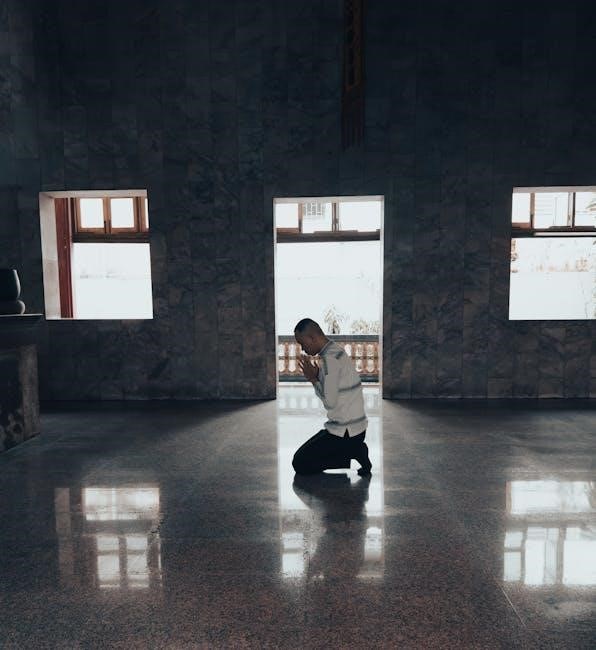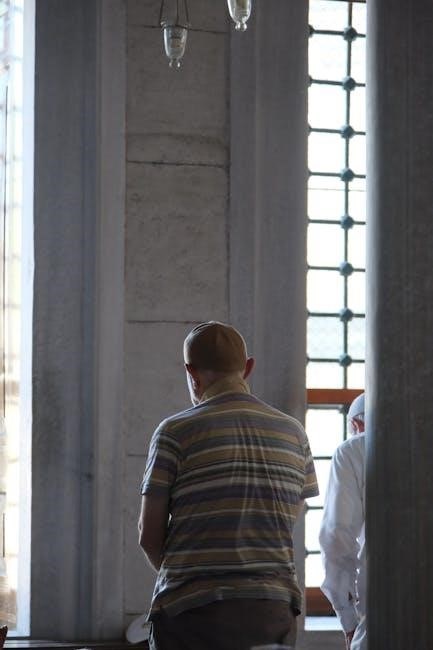Thomas Merton’s prayer life reflects his deep commitment to spirituality, emphasizing patience, self-discovery, and God’s presence. His teachings highlight the importance of silence and biblical reflection, offering timeless wisdom for spiritual growth.
1.1 Who Was Thomas Merton?
Thomas Merton was a prominent 20th-century Catholic monk, writer, and theologian. Born in 1915, he joined the Trappist Order in 1941, becoming a vocal figure in Christian spirituality. Merton’s writings explored prayer, contemplation, and the human search for meaning, influencing countless readers. His works, such as The Seven Storey Mountain, remain iconic, blending deep faith with personal reflection. Merton’s legacy endures as a bridge between monastic tradition and modern spirituality, offering insights that transcend denominational boundaries. His life and writings continue to inspire those seeking deeper connection with God and self.
1.2 The Significance of Prayer in Merton’s Life
Prayer was the cornerstone of Thomas Merton’s spiritual life, serving as his primary means of connecting with God. Through prayer, Merton navigated life’s uncertainties, seeking guidance and solace. His writings often reflect the transformative power of prayer, which he viewed as both a dialogue with God and a journey of self-discovery. Merton believed prayer was not merely a ritual but a profound encounter that fostered intimacy with the divine. His teachings emphasize the importance of silence, stillness, and surrender, making prayer a vital practice for deepening faith and understanding God’s will. This practice shaped his identity and legacy profoundly.
1.3 Overview of Merton’s Approach to Prayer
Thomas Merton’s approach to prayer was deeply rooted in contemplation and biblical reflection. He emphasized the importance of silence, stillness, and surrender, viewing prayer as a dialogue with God. Merton’s method integrated meditation and the use of scripture, particularly the Psalms, to foster a deeper connection with the divine. His approach encouraged patience, self-discovery, and attention to God’s presence, blending faith and introspection. This holistic practice aimed to transcend surface-level devotion, leading to a profound, transformative spiritual experience. Merton’s teachings continue to inspire seekers of a meaningful prayer life.

Key Themes in Merton’s Prayer Teachings
Merton’s prayer teachings emphasize patience, surrender, and divine presence. His writings highlight the Psalms’ influence and the importance of stillness, encouraging a deep, faith-centered prayer life.
2.1 The Importance of Silence in Prayer
Silence is a cornerstone of Thomas Merton’s prayer teachings, emphasizing its role in creating space for God’s presence. Merton believed silence fosters a deeper connection, allowing individuals to listen and surrender. He often referenced the Psalmic phrase, “Be still and know that I am God,” highlighting stillness as a means to encounter the divine. Silence, for Merton, was not an absence of sound but a presence of patience, enabling believers to attune to God’s will. This approach remains universally appealing, offering a pathway to spiritual renewal and inner peace in a chaotic world.
2.2 The Role of Faith in Merton’s Prayer Life
Faith was central to Thomas Merton’s prayer life, serving as the foundation for his spiritual practices. He believed faith provided orientation in uncertainty, enabling trust in God’s will. Merton’s writings often expressed the conviction that faith allows individuals to embrace the unknown, surrendering to divine guidance. His prayers reflect a deep reliance on faith as a means to connect with God’s presence, even in moments of doubt or confusion. This emphasis on faith underscores its transformative power in nurturing a meaningful and authentic prayer life.
2.3 The Concept of “Being Still” in Prayer
Merton’s emphasis on “being still” in prayer stems from Psalm 46:10, “Be still and know that I am God.” This concept encourages believers to quiet the mind and heart, creating space for divine presence. Merton viewed stillness as a means to transcend distractions, fostering deeper spiritual awareness and intimacy with God. He advocated for moments of silence and reflection, allowing individuals to discern God’s will and experience inner peace. This practice remains a cornerstone of his teachings, promoting a contemplative approach to prayer that enriches the spiritual journey.
Merton’s Philosophy of Prayer
Merton’s philosophy of prayer centers on patience, adoration, and self-discovery, emphasizing God’s presence and the soul’s deepening connection with the divine through contemplative practices and surrender.
3.1 Prayer as a Form of Patience
Prayer, for Merton, is a higher form of patience, rooted in adoration and surrender. It involves waiting in stillness, trusting God’s will, even amid uncertainty. Merton emphasizes that prayer requires patience to embrace the unknown, letting go of the need for immediate answers. This patience is not passive but an active surrender, allowing God to work in His time. Merton’s prayers often express this tension between seeking guidance and trusting in divine providence, highlighting prayer as a journey of faith and endurance, where patience becomes a means of deepening one’s relationship with God.
3.2 Prayer as a Means of Self-Discovery
Merton viewed prayer as a mirror to the soul, a journey of introspection where one confronts their true self. Through prayer, individuals uncover their limitations, desires, and the depths of their humanity. Merton emphasized that prayer reveals the self in its raw form, fostering humility and honesty. This self-discovery is not an end but a catalyst for growth, enabling believers to align their lives with God’s love and will. Prayer, for Merton, is a transformative process that awakens the heart to its true identity and purpose.
3.3 The Centrality of God’s Presence in Prayer
For Merton, prayer is rooted in the belief that God’s presence is always available, though often unnoticed. He emphasizes that prayer is not just a request but a continuous act of faith, centered on acknowledging and surrendering to God’s will. Merton teaches that prayer is about cultivating awareness of God’s presence in everyday life, even in uncertainty. This presence transforms prayer into a profound encounter, fostering intimacy and guiding believers toward a deeper union with the divine. Prayer, for Merton, is less about words and more about being attentive to the silent, abiding God.
The Role of Scripture in Merton’s Prayer Life
Merton’s prayer life was deeply rooted in Scripture, particularly the Psalms, which he often meditated on to connect with God’s presence and divine wisdom in his spiritual journey.
4.1 The Influence of the Psalms on Merton’s Prayer
The Psalms deeply shaped Thomas Merton’s prayer life, offering emotional expression and spiritual guidance. He often meditated on verses like “Be still and know that I am God,” finding comfort in their timeless wisdom. The Psalms’ raw honesty and divine connection resonated with Merton, enriching his contemplative practice and fostering a deeper relationship with God. Their rhythms and themes became a cornerstone of his prayer, blending human struggle with sacred presence.
4.2 The Use of Biblical Passages in Meditation
Thomas Merton frequently incorporated biblical passages into his meditation practice, finding profound inspiration in Scripture. He believed that meditating on texts like the Psalms and Gospels fostered a deeper connection with God’s will. Merton’s approach emphasized reflection on specific verses, allowing their truths to sink deeply into the soul. This method encouraged a dialogue with the divine, transforming prayer into a lived experience of faith and spiritual growth, rather than mere recitation.
4.3 The Phrase “Be Still and Know That I Am God”
Thomas Merton often reflected on the Psalmic phrase, “Be still and know that I am God,” seeing it as a cornerstone of contemplative prayer. He emphasized the importance of stillness as a means to quiet the mind and heart, allowing one to encounter God’s presence. Merton believed that in stillness, individuals could transcend worldly distractions and experience a deeper, more intimate relationship with the divine. This phrase became a guiding principle in his prayer life, encouraging surrender and trust in God’s will. Its simplicity and profundity continue to inspire spiritual seekers today, offering a timeless path to inner peace and divine connection. Merton’s writings highlight how this phrase embodies the essence of prayer as a journey into the heart of God, where true knowing and being still are inseparable from faith and devotion.

Merton’s Approach to Contemplative Prayer
Merton viewed contemplative prayer as a higher form of patience and adoration, emphasizing inner stillness and reflection to seek God’s presence and transform the whole person.
5.1 The Definition of Contemplative Prayer
Contemplative prayer, as defined by Thomas Merton, is a profound and intimate form of prayer that involves being still and knowing God. It is not about asking for things but about resting in God’s presence. Merton describes it as a higher form of patience and adoration, where one seeks to align their will with God’s. This prayer is centered on attention to God’s presence and love, often involving silence and faith. It is a surrender to the mystery of God, allowing Him to transform the heart and mind. Merton emphasizes that contemplative prayer is a gift, a grace that deepens one’s relationship with the divine.
5.2 The Practice of Attention in Prayer
Thomas Merton emphasizes that prayer requires attention to God’s presence, fostering a deeper dialogue with Him. He defines attention as a deliberate focus on God, avoiding distractions and self-centered thoughts. This practice involves cultivating stillness and patience, allowing one to discern God’s will. Merton urges believers to move beyond routine prayers and instead embrace a mindful, heartfelt engagement with the divine. By attending to God’s love and presence, prayer becomes a transformative experience, nurturing spiritual growth and intimacy with God;
5.3 The Role of Mystical Experiences in Prayer
Thomas Merton viewed mystical experiences as central to prayer, emphasizing their transformative power. These experiences, rooted in silence and contemplation, allow believers to encounter God’s presence directly. Merton believed that such moments transcend words, fostering humility and surrender. He stressed that mystical prayer is not about seeking emotional highs but about deepening one’s relationship with God. These experiences, he argued, lead to profound spiritual growth and a greater understanding of divine love, ultimately transforming the soul and guiding it toward union with God.
Merton’s Influences and Inspirations
Thomas Merton’s prayer was influenced by Christian mystics, Eastern spirituality, and monastic traditions, shaping his contemplative approach.
6.1 The Influence of Christian Mystics
Christian mystics profoundly shaped Thomas Merton’s prayer life, particularly through their emphasis on interior prayer and a personal relationship with God. Mystics like St. John of the Cross and Julian of Norwich inspired Merton’s focus on contemplation and inner transformation. Their teachings on surrendering to God’s will and embracing spiritual darkness resonated deeply with Merton, influencing his belief in prayer as a journey of self-discovery and union with the divine. Merton often reflected on their writings, integrating their insights into his own spiritual practices and teachings on prayer.
6.2 The Impact of Eastern Spirituality on Merton’s Prayer
Thomas Merton’s prayer life was deeply influenced by Eastern spirituality, particularly Zen Buddhism and Taoism. He explored the parallels between Christian mysticism and Eastern contemplative practices, finding common ground in the pursuit of inner stillness and union with the divine. Merton was drawn to the simplicity and directness of Eastern meditation, which he integrated into his understanding of prayer as a way of being present to God. His study of Eastern traditions enriched his belief in the universality of spiritual truth and the importance of transcending words to experience God’s presence.
6.3 The Role of Monastic Life in Shaping His Prayer
Thomas Merton’s monastic life profoundly shaped his prayer, rooted in the Trappist tradition of contemplation and community. The structured rhythm of monastic living, including prayer, work, and study, provided a foundation for his spiritual practices. The emphasis on stability and fidelity in prayer mirrored the monastic vows, fostering a life of abandonment to God’s will. Merton’s prayer was deeply influenced by the Liturgy of the Hours and the communal recitation of the Psalms, blending personal devotion with shared worship. The monastic environment also taught him the value of manual labor as a form of prayer, integrating work and contemplation into a seamless whole.

The Challenges of Prayer According to Merton
Merton often spoke about the struggle to surrender to God’s will, the uncertainty in prayer, and the persistent doubt that can arise in spiritual life.
7.1 The Difficulty of Surrendering to God’s Will
Merton often expressed the struggle of surrendering to God’s will, acknowledging the uncertainty and doubt that can accompany prayer. He emphasized that true surrender requires trust and faith, even when the path ahead is unclear. Merton’s writings reveal his own grappling with this challenge, highlighting it as a universal difficulty in the spiritual journey. Surrender, for Merton, is not passive but an active commitment to trust in God’s plan, despite the unknown. This struggle remains a central theme in his teachings on prayer and spirituality.
7.2 The Struggle with Uncertainty in Prayer
Merton frequently addressed the struggle with uncertainty in prayer, acknowledging the natural human inclination to seek clarity and resolution. He believed that prayer often leads to more questions than answers, requiring patience and faith. Merton emphasized that uncertainty is not a failure but an opportunity to deepen trust in God; His writings reveal a tension between the desire for clear guidance and the acceptance of mystery, highlighting the importance of perseverance in prayer even when clarity eludes us. This struggle remains a profound aspect of his spiritual teachings.
7.3 The Problem of Doubt in Spiritual Life
Merton often grappled with doubt in his spiritual journey, recognizing it as a natural yet challenging aspect of prayer. He acknowledged that doubt could arise from the uncertainty of God’s will or the silence experienced in prayer. Merton believed doubt was not to be feared but confronted honestly, as it could deepen faith and lead to greater authenticity. His writings suggest that doubt, when embraced, can purify one’s relationship with God, fostering a more genuine and humble prayer life. Merton’s approach encourages believers to navigate doubt with patience and trust, viewing it as a pathway to spiritual maturity.
Practical Guidance from Merton on Prayer
Merton advises regular prayer practice, journaling reflections, and embracing solitude to deepen spiritual connection. He emphasizes patience, surrender to God’s will, and using scripture for meditation, fostering a meaningful prayer life.
8.1 The Importance of Regular Prayer Practice
Thomas Merton emphasizes the necessity of consistent prayer practice, urging believers to cultivate patience and adoration in their spiritual lives. He highlights that prayer is not merely a request but a profound act of surrender to God’s will. Regular prayer, according to Merton, fosters a deeper connection with the divine, allowing individuals to trust in God’s plan even when uncertain. By prioritizing daily prayer, one can find guidance, peace, and transformation, aligning with Merton’s belief that prayer is a cornerstone of spiritual growth and intimacy with God.
8.2 The Role of Journaling in Prayer Reflection
Thomas Merton viewed journaling as a vital tool for reflecting on one’s prayer life, enabling individuals to document their thoughts, emotions, and spiritual insights. Through this practice, believers can trace their journey, identifying patterns of growth and moments of divine encounter. Journaling also serves as a means of honest self-expression, fostering a deeper understanding of God’s presence in daily life. For Merton, this practice complemented his teachings on prayer as a patient and humble journey of self-discovery and surrender to God’s will. By faithfully recording reflections, one cultivates mindfulness and gratitude, enriching their spiritual path.
8.3 The Value of Solitude in Deepening Prayer
Thomas Merton deeply valued solitude as a cornerstone of prayer, believing it fosters a profound connection with God. In solitude, distractions fade, allowing one to listen to God’s voice and experience stillness. Merton’s monastic life exemplified this, as he found solitude essential for introspection and spiritual growth. By embracing solitude, individuals can cultivate humility, openness, and a deeper understanding of God’s presence in their lives, transforming prayer into a meaningful encounter with the divine. Solitude, for Merton, was not isolation but a sacred space for communion with God.

Merton’s Prayer in the Context of Modern Life
Thomas Merton’s prayer teachings remain highly relevant in modern life, offering guidance for fostering intimacy with God amidst today’s distractions and fast-paced world.
9.1 The Relevance of Merton’s Prayer Teachings Today
Thomas Merton’s prayer teachings remain profoundly relevant in modern life, offering timeless wisdom for nurturing spirituality. His emphasis on silence, patience, and self-discovery resonates with today’s fast-paced world. Merton’s insights into human spirituality and the universal need for connection with the divine continue to inspire diverse audiences. His teachings encourage balancing contemplation with action, making them accessible to people of all faiths and backgrounds. Merton’s practical guidance and mystical reflections provide a pathway to deeper prayer and intimacy with God, addressing contemporary spiritual longing and the search for meaning.
9.2 The Application of Merton’s Prayer in Daily Life
Merton’s prayer teachings offer practical guidance for everyday life, emphasizing the importance of mindfulness and presence. His approach encourages integrating prayer into daily activities, fostering a sense of God’s presence in ordinary tasks. Merton’s philosophy promotes moments of silence and reflection, helping individuals cultivate patience and self-awareness. By applying his teachings, one can deepen their spiritual life, finding meaning and purpose in routine experiences. His advice on journaling and meditative practices also provides a framework for sustained spiritual growth, making prayer a natural part of daily living.
9.3 The Universal Appeal of Merton’s Spiritual Insights
Merton’s spiritual insights transcend religious boundaries, resonating with diverse audiences. His teachings on prayer, silence, and self-discovery speak to universal human experiences, making them accessible to people from various faith traditions. Merton’s emphasis on inner transformation and the search for meaning appeals to seekers of all backgrounds. His writings, particularly on prayer, have inspired interfaith dialogue and spiritual growth worldwide, demonstrating the timeless relevance of his wisdom in addressing the human condition.

The Legacy of Thomas Merton’s Prayer Teachings
Thomas Merton’s prayer teachings continue to inspire spiritual growth, offering timeless wisdom that transcends generations. His writings remain a cornerstone of Christian spirituality, guiding seekers worldwide.
10.1 The Impact on Contemporary Christian Spirituality
Thomas Merton’s prayer teachings profoundly shaped contemporary Christian spirituality, offering a bridge between traditional monastic practices and modern life. His emphasis on silence, contemplation, and personal relationship with God resonates deeply, inspiring many to seek deeper spiritual connection. Merton’s ability to integrate mystical experiences with everyday life has made his writings accessible and transformative for diverse audiences. His legacy continues to influence spiritual leaders and seekers, fostering a renewed focus on prayer as a means of self-discovery and communion with the divine.
10.2 The Influence on Interfaith Dialogue
Thomas Merton’s prayer teachings have significantly influenced interfaith dialogue, fostering mutual respect and understanding. His exploration of Eastern spirituality and appreciation for Buddhist and Islamic mystical traditions highlighted shared spiritual truths. Merton’s belief in the universality of human spirituality encouraged dialogue, bridging divides between faiths. His writings emphasize the common quest for meaning and connection with the divine, inspiring collaboration and unity across religious boundaries. This legacy continues to inspire interfaith efforts, promoting peace and harmony in a diverse world.
10.3 The Enduring Popularity of Merton’s Writings
Thomas Merton’s writings on prayer remain remarkably popular due to their timeless wisdom and universal appeal. His accessible prose, blending spirituality with personal reflection, resonates across generations. Works like The Sign of Jonas and The Seven Storey Mountain continue to inspire readers seeking deeper faith and contemplation. Merton’s ability to articulate complex spiritual concepts in a relatable manner ensures his enduring relevance. His writings are widely shared in PDF formats, making his insights accessible to a global audience, cementing his legacy as a leading voice in Christian spirituality.

Resources for Studying Merton’s Prayer
Key resources include A Thomas Merton Reader (free PDF), The Sign of Jonas, and The Seven Storey Mountain, offering deep insights into his prayer life and teachings.
11.1 Notable Books by Thomas Merton on Prayer
Thomas Merton’s writings on prayer are captured in notable books such as A Thomas Merton Reader and The Sign of Jonas. These works offer profound reflections on contemplative prayer, faith, and spiritual growth. The Seven Storey Mountain, while autobiographical, also explores his prayer journey. These books provide insights into his mystical experiences and the role of prayer in his monastic life. They remain essential resources for understanding Merton’s spiritual teachings and practices.
11.2 Recommended PDF Resources on Merton’s Prayer
Notable PDF resources on Thomas Merton’s prayer include A Thomas Merton Reader, a comprehensive anthology of his writings. This free PDF offers insights into his spiritual reflections, meditation practices, and contemplative prayer. Another recommended resource is his classic text on prayer, available for download, which blends mystical and practical advice. These PDFs provide accessible guidance for those seeking to deepen their prayer life and understand Merton’s spiritual legacy. They are invaluable for scholars and seekers alike, offering timeless wisdom on prayer and spirituality;
11.3 Online Communities Discussing Merton’s Prayer Teachings
Online forums and groups dedicated to Thomas Merton’s prayer teachings provide vibrant spaces for discussion and reflection. Communities on platforms like Facebook and Reddit share insights, personal experiences, and resources. These spaces foster deeper understanding of Merton’s spirituality and its application in modern life. Members often recommend PDFs, books, and articles, creating a rich repository of knowledge. Such communities serve as hubs for spiritual growth, encouraging individuals to embrace Merton’s contemplative approach to prayer and apply it in their daily lives.

Final Thoughts on Merton’s Prayer
Thomas Merton’s prayer teachings offer timeless wisdom, inviting seekers to embrace patience, self-discovery, and God’s presence, inspiring a deeper, transformative spiritual journey.
12.1 The Timeless Wisdom of Merton’s Prayer
Thomas Merton’s prayer teachings embody timeless wisdom, offering insights into patience, adoration, and the universal quest for meaning. His reflections on Job and the Psalms highlight prayer as a higher form of patience and surrender. Merton’s emphasis on “being still” and knowing God’s presence resonates deeply, transcending time and culture. His writings inspire spiritual growth, encouraging seekers to embrace prayer as a journey of self-discovery and faith. Merton’s legacy endures, providing guidance for modern spiritual seekers, making his teachings on prayer as relevant today as they were in his lifetime.
12.2 The Encouragement to Embrace Prayer as a Journey
Merton’s teachings invite us to view prayer as a lifelong journey, not a destination. His wisdom encourages patience, trust, and openness to God’s will; By emphasizing faith and surrender, Merton’s writings inspire us to embrace prayer as a path of discovery and growth. His reflections remind us that prayer is a dynamic process, unfolding uniquely for each individual. This perspective encourages perseverance, offering comfort in uncertainty and doubt, making prayer a transformative and enduring aspect of spiritual life.
12.3 The Invitation to Deepen One’s Spiritual Life
Merton’s prayer teachings extend an invitation to deepen spiritual life through balance and purpose. His writings encourage embracing prayer as a means to cultivate inner peace and intimacy with God. By emphasizing patience, adoration, and trust, Merton guides individuals to move beyond superficial practices. His reflections inspire a journey of self-discovery, urging believers to surrender to God’s will and find meaning in uncertainty. This invitation calls us to transcend routine and embrace prayer as a transformative path to spiritual growth and connection with the divine.
